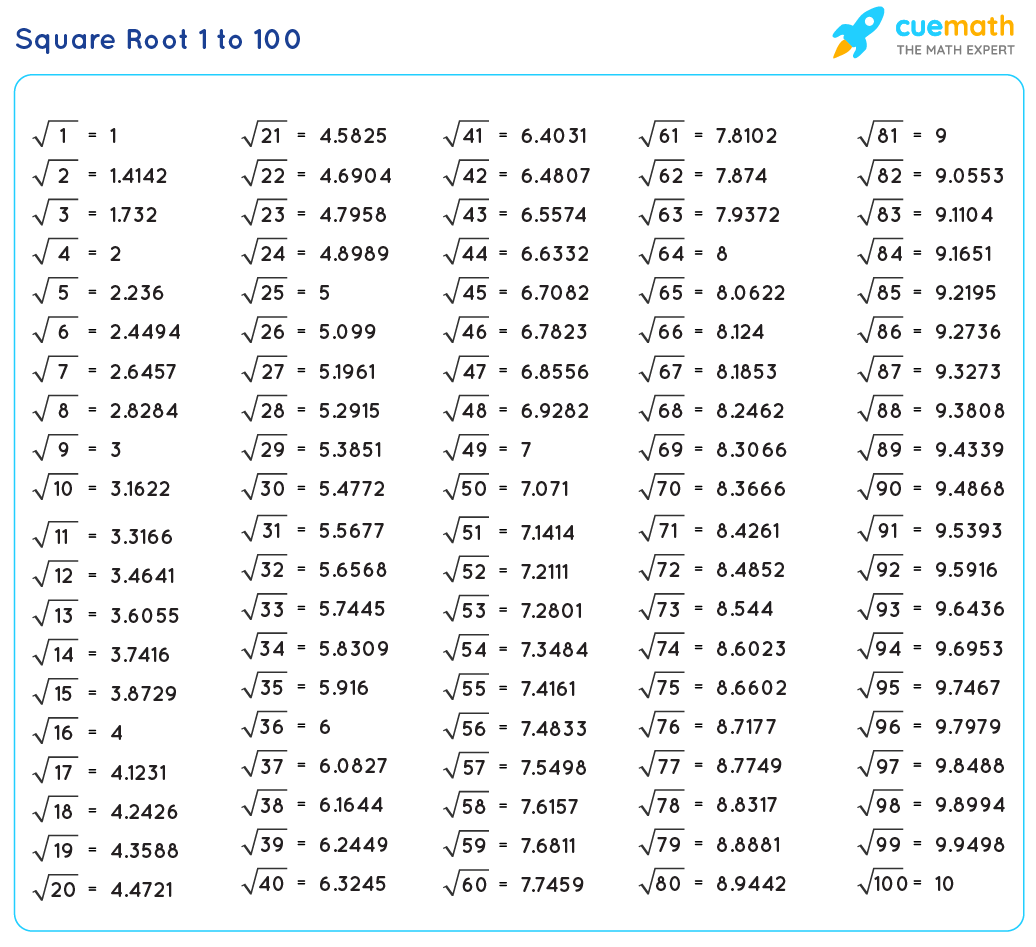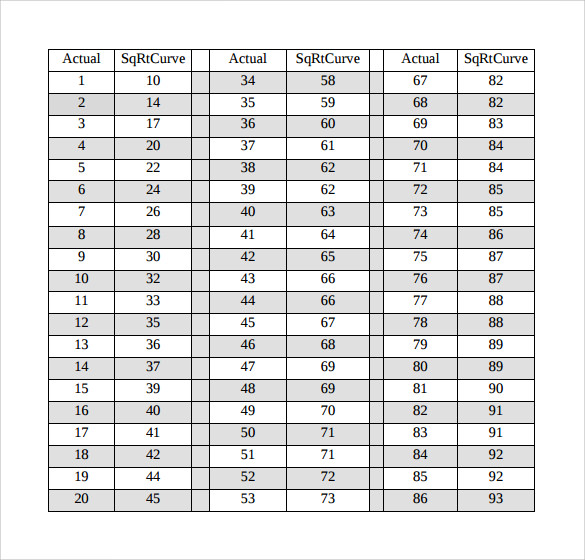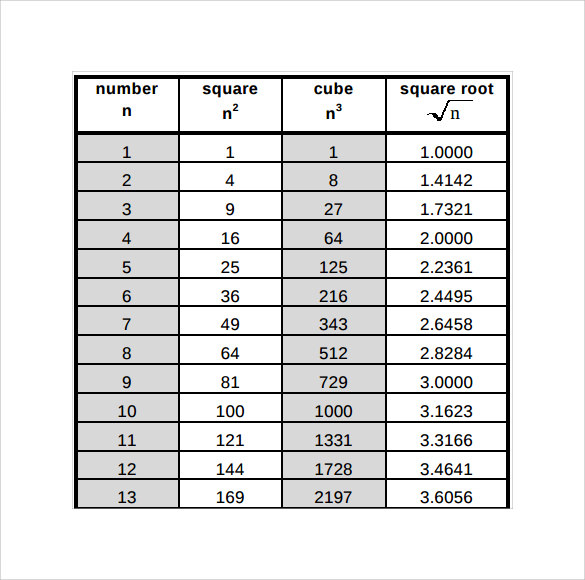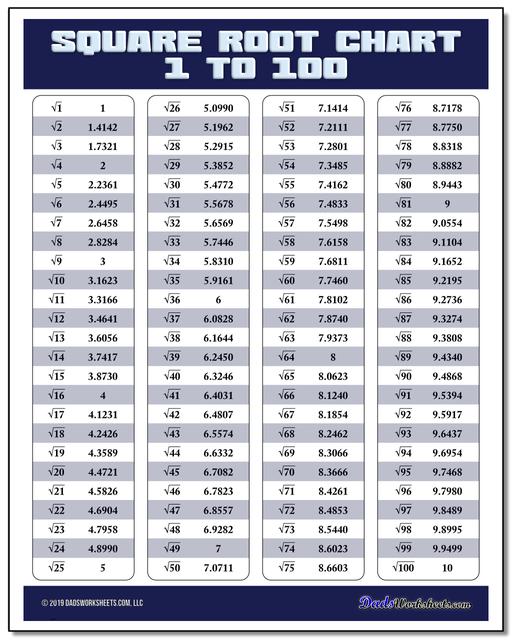
7 Photos Cube Root Table 1 100 Pdf And Review Alqu Blog
How to Calculate the Values of Squares 1 to 100? In order to calculate the squares from 1 to 100, we can use any one of the following methods: Method 1: Multiplication by itself: In this method, the number is multiplied by itself and the resultant product gives us the square of that number. For example, the square of 8 = 8 × 8 = 64.

Whether you're looking for a list of perfect square roots, or a complete table of square roots
Square Root Chart for 1 - 100 A square root is number which produces a definite number when multiplied by itself. i.e., the square root of 4 is √4=2 which when multiplied by itself gives the original definite number 4. This is an online chart which consists of a list of square root values for numbers 1 to 100. Square Root Chart

Square Root 1 to 100 Value of Square Roots from 1 to 100 [PDF]
How do you Find the Square Root of a Number from 1 to 100? Solved Examples Frequently Asked Questions Introduction The square root of a number is a value that, when multiplied by itself, gives us the original number. Hence, finding the square root is the converse of finding the square of a number.

FREE 7+ Sample Square Root Chart Templates in PDF
Square root 1 to 100: Square root of a number is a value, which on multiplication by itself, gives the original number. If p is a positive integer, then the square root of p is represented by √p, such that √p = q. There is a list of square roots of 1 to 100 numbers, mentioned in this article.

FREE 7+ Sample Square Root Chart Templates in PDF
In mathematics, the general root, or the nth root of a number a is another number b that when multiplied by itself n times, equals a. In equation format: n √ a = b b n = a Estimating a Root Some common roots include the square root, where n = 2, and the cubed root, where n = 3. Calculating square roots and nth roots is fairly intensive.

1 to 100 Cube Root Table Chart List MyDailyGK
Method 1: Repeated Subtraction Method The easiest and a simple method to find the square root of a given number is repeated subtraction. In this method, we need to subtract the consecutive odd numbers till we get 0. However, this method is suitable for only perfect square numbers, such as 4, 9, 16, 25, etc.

squares, powers, square roots Math methods, Studying math, Gcse math
Square root 1 to 100 is the list of square roots of all the numbers from 1 to 100. We know that the square root of a number is the number which when multiplied by itself gives the original number. In other words, if '3' is the square root of '9', it means that 3 × 3 = 9 and is expressed as √9 = 3.

SQUARE ROOT Chart To 100 Table Printable Math Poster UK ubicaciondepersonas.cdmx.gob.mx
Number = 576. Prime factorization of the given number = 2 x 2 x 2 x 2 x 2 x 2 x 3 x 3. Square Root of √ 576 = 2 x 2 x 2 x 3 = 24. 4. Repeated Subtraction Method. According to this method, if the provided number is a perfect square, we can figure out the square root by the following steps.

My Math Resources Square Roots Reference Card & Perfect Squares Reference Sheet
Learning cubes 1 to 100 can help students to recognize all perfect cubes from 1 to 1000000 and approximate a cube root by interpolating between known cubes. The values of cubes 1 to 100 are listed in the table below. The students are advised to memorize these cubes 1 to 100 values thoroughly for faster math calculations.

Square Root Table 1 100
Step 1: Enter the radical expression below for which you want to calculate the square root. The square root calculator finds the square root of the given radical expression. If a given number is a perfect square, you will get a final answer in exact form. If a given number is not a perfect square, you will get a final answer in exact form and.

Negative Square Root Of 100 ROOTSJ
There is a list of square roots of 1 to 100 numbers we have mentioned in this article. But before heading for it, let us learn some basics here. The symbol to denote square root is '√'. It is also called a radical symbol and the number denoted under this symbol is called the radicand. Say, in √3, 3 is the radicand.

GCSE Maths Evaluate whole number roots Teaching Resources
Conversion tables to quickly find the Square Root of numbers 1 thru 100 by row and column lookup. Tables include squared and cubed values of numbers. Square Root Conversion Tables. Home Everyday Mathematics Square Root. How to convert an integer to its square root using the tables below: 1) Find a value in the column labeled X..

List of Square Roots and Cube Roots from 1 to 100
Printable square root chart listing the decimal roots from 1-100, chart of perfect squares with a scale visualation and more! Printable PDFs.. While we usually learn about square roots in the context of integers, we can also find the square roots of numbers that are not integers. For example, the square root of 10 is a decimal number close.

How to Find the Square Root of a Number Maths with Mum
What is Cube Root 1 to 100? Cube Root 1 to 100 is the list of cube roots of all numbers from 1 to 100. The values of cube roots from 1 to 100 range from 1 to 4.64158. In cube root 1 to 100, the numbers 1, 8, 27 and 64 are perfect cubes and the remaining numbers are non-perfect cubes i.e. their cube root will be irrational.

Squares and Square Roots Chart Free Download
Davneet Singh Square root of numbers from 1 to 100 areNumberSquareSquare root111.000241.414391.7324162.0005252.2366362.4497492.6468642.8289813.000101003.162111213.317121443.464131693.606141963.742152253.873162564.000172894.123183244.243193614.359204004.472214414.583224844.690235294.796245764.899256255.000266765.

What Is The Sqaure Root Of 1 ROOTSG
Method 1: Prime Factorization Example: Find the value of √64 using the prime factorization method. Solution: We know that, Prime factorization of 64 is 8 × 8 Pairing Prime Factors: 8 Thus, the value of √64 = 8 Method 2: Long Division Method Example: Find the value of √18 using long division method Solution: